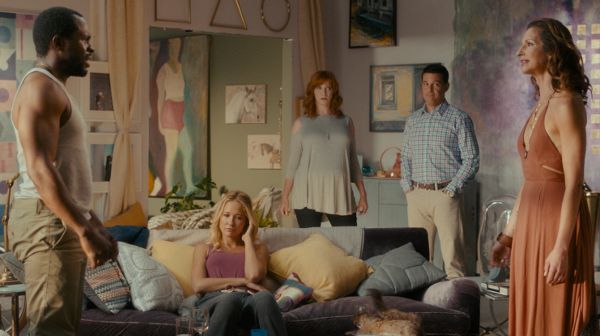Eye For Film >> Movies >> Motherhood (2018) Film Review
Motherhood
Reviewed by: Jane Fae

Sharp. Witty. Challenging. Insightful. Disruptive. And yes: feminist to boot! Dear reader, it is hard when presented with a film such as Motherhood not to reach for the thesaurus. Or lexicon, since this is not one thing, easily categorised, but many.
Bittersweet comedy of manners springs to mind. Or maybe just mums and motherhood under the microscope. Confronted with a thing that in the space of an hour and 20 minutes takes on so many different forms it is not easy to nail down a firm point of view. What did I think of it? Good question, and one that I am professionally obliged to answer.
But even now, after watching all the way through, from socially awkward beginning to car crash ending, I am not entirely sure.
The action kicks off with a visit. Old friends from University, Karen (Christina Hendricks) and Don (David Alan Basche), drop in on struggling artist Tina (Alysia Reiner, who also produced this film) and recently acquired husband Wayne (Gbenga Akkinagbe). I say action: Motherhood has its roots in a play – Egg by Risa Mickenberg – and those theatrical roots most definitely show. All of the action – with the exception of a few establishing scenes - takes place in two locations: upstairs and downstairs in Karen's apartment.
And it is a film that is heavily grounded in conversation and words. Listen carefully, because what matters very much is the constant hammer blow succession of exchanges. Words, words, words. Sometimes witty. Sometimes vicious. Occasionally warm. Never surplus.
These are three people – Karen, Don and Tina – with a lifetime of chitter behind them. I didn't count, but my sense was that in words alone these three dominated. Then Wayne and, bringing up the rear, as much because she only arrives late to the action, mutual acquaintance and surrogate mum Kiki (Anna Camp). They wordfence as naturally as they breathe. Its all a game until someone hits home, gets in under another's defences, and blood is drawn.
The narrative starts inauspiciously. For our trio's paths may once have intersected but since, they have taken very different roads. Karen towards the penury and instability of experimental artist, Don toward big bad property development. Tina is very obviously pregnant. But then the bombshell: so is Karen.
The fact she does not look it is because her pregnancy is being surrogated, courtesy of the youthful Kiki. As Tina explains: “traditional family role structure sucks for everyone: if you didn't have to do it for yourself why would you?
The stage is set for some very predictable clashes around money and class and motherhood and, 20 minutes in, I was all ready to dismiss this as just another play about same. All wit and intellect, but no heart. But then it takes off. Turns nasty. And nice. And twists and turns away from where it began as it dissects and breaks down every character we've just met and think we know.
As it heads, inevitably, towards a fracturing of relationships and grand showdown at the end.
Which is why it is a cut above the usual.
This is a feminist film in every sense of the word. It was directed by Marianna Palka, previously known for Good Dick and Bitch. It had a 70% female crew, and all female department heads. But if you think it is going to try and sell you 'one true way' feminism, think again. As Alysia Reiner explained in an interview: “the point - we can disagree about something as important as motherhood, and still love one another. I hope everyone comes away with the courage and compassion and curiosity to live their own truth.”
Which is an interesting and uplifting take, as Tina's downfall in the film is trailed with this sharpest of sharp guttings of a certain sort of feminism. No spoilers – so no who, why or when - but: “you've been attacking anyone who makes choices you don't agree with.
“It's all all theories and semantics with you.”
All I will say, as someone who has occasionally found themselves in the sights of a particular form of exclusionist Stalinist feminism: at this point I was frantically taking notes and paying very close attention indeed.
Reviewed on: 11 Apr 2019















